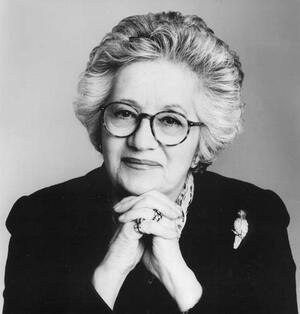Judith Leiber
Judith Leiber carved a unique place for herself in the world of fashion as the designer of some of the most inventive and sought-after handbags in the world. Leiber became the first woman member of the Hungarian Handbag Guild before fleeing the Nazi occupation with her family. In America, she worked for various handbag manufacturers before starting her own company in 1963. She is most famous for her whimsical crystal minaudières, metal shells encrusted with beads to form shapes such as slices of watermelon or animals. Leiber’s handbags are in the permanent collections of the Smithsonian, the Metropolitan Museum of Art, and the Victoria and Albert Museum in London, among others. In 2008, one of her minaudières was featured in the Sex and the City movie.
“Hitler put me in the handbag business,” Judith Leiber recalled in Enid Nemy’s book, Judith Leiber: The Artful Handbag. She was born Judith Peto in Budapest, Hungary, on January 11, 1921. Her well-to-do parents, Emil and Helen Peto, originally planned that she make a fortune in skin creams. Instead, she enrolled in the Hungarian Handbag Guild as its first woman member.
Early life: Nazi occupation of Hungary and migration to America
Judith, her older sister Eva, and her mother survived the Nazi occupation of Budapest by staying in a building designated for Jews and then in a house set aside for Swiss citizens. Her father, an Austro-Hungarian who managed the grain department of a bank, obtained a pass for himself and forged the words “and family,” using the same typewriter used to issue the pass.
During the war, Judith met Gerson (Gus) Leiber, a Brooklyn native, who was a Signal Corps sergeant in the United States Army serving in Eastern Europe. The two married in 1946 and moved to New York City in 1947. Gerson Leiber was an abstract expressionist painter and a member of the National Academy of Design. His paintings hang in the Philadelphia Museum of Art, the Smithsonian Museum in Washington, D.C., the Israel Museum in Jerusalem, and other institutions.
It was Gerson who encouraged Leiber to strike out on her own in 1963 after she had worked for various handbag manufacturers. Her company, situated in midtown Manhattan, began with a handful of employees and has since grown to two hundred strong.
Minaudières
Though she has created scores of different handbag styles in materials ranging from cashmere to fish skin, Leiber is probably best known for her crystal minaudières. These evening bags are constructed of a metal shell encrusted with beads and have taken the form of baby pigs, slices of watermelon, penguins, and snakes. Almost every first lady since Mamie Eisenhower has been the owner of at least one Judith Leiber original. Jacqueline Kennedy took hers to the Inaugural Ball, while Hillary Clinton carried her Socks the cat pocketbook when dressed in evening gowns.
It is primarily first ladies and the very rich who can afford to own a Leiber handbag, which can carry a price tag of up to $7,500. Collecting these bags became synonymous with fashion savvy, indulgence and wealth. Beverly Sills, former chair of Lincoln Center for the Performing Arts, owned seventy bags; New York socialite Pat Buckley owns eighteen. However, these figures pale in comparison to the Olympic champion of Leiber collecting, Bernice Norman, an arts patron in New Orleans, who owns close to three hundred bags.
Leiber’s legacy
Time Products, London purchased Leiber’s firm in March 1993 for $18 million. Leiber herself retired in 1998, but the company has continued to produce new creations inspired by Leiber’s original designs. In 2000, Time Products sold Judith Leiber Inc. to the Pegasus Apparel Group, which then changed the company’s name to the Leiber Group the following year.
Judith Leiber maintained boutiques in such upscale department stores as Bergdorf Goodman, Saks Fifth Avenue and Neiman Marcus, and she made personal appearances at flagship stores.
Her jeweled creations make Leiber the “Fabergé of today,” as one customer remarked. She has been similarly recognized by professional organizations. After only six years in business, she received the Swarovski Great Designer award for artistic use of the company’s rhinestones. She was also the first in her field to win the Coty American Fashion Critics Award (1973). In 1980, she won the Neiman Marcus Winged Statue for Excellence in Design, and in 1991, the Silver Slipper Award from the Costume Institute of the Museum of Fine Arts in Houston. In 1994, she accepted the Lifetime Achievement Award from the Council of Fashion Designers of America, wearing a striking blue evening gown and one of her minaudières around her neck as a pendant. Judith Leiber bags are on display in the permanent collections of museums around the country, including the Metropolitan Museum of Art (New York), the Smithsonian Institution (Washington, DC), the Historical Society of Chicago, the Houston Museum of Fine Arts, the Dallas Museum of Art and the Los Angeles County Museum of Art, as well as in the Victoria and Albert Museum (London). A retrospective of her designs was displayed at New York’s Fashion Institute of Technology in late 1994. Fashioning Art: Handbags by Judith Leiber, an exhibit of Leiber’s creations organized by the Corcoran Gallery of Art (Washington DC), appeared at the George Bush Presidential Library and Museum in College Station, Texas. This 2004 exhibit featured over 160 Leiber bags—from her first beaded bag of 1967 to the last Judith Leiber original of 1998.
Leiber passed away on April 28, 2018, at the age of 97.
Goodman, Wendy. “To Have and to Hold.” Harper’s Bazaar, no. 3396 (November 1994): 68.
Nemy, Enid. Judith Leiber: The Artful Handbag (1995).
“Splurge.” The New Yorker 68, no. 14 (May 25, 1992): 28.
Wadyka, Sally. “Small Wonders.” Vogue 185, no. 3 (March 1995), 232+.
Witchel, Alex. “Handbags That Make Headlines.” NYTimes, May 1, 1996, C1.




